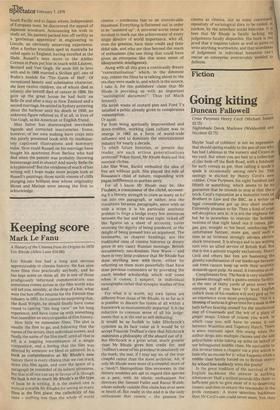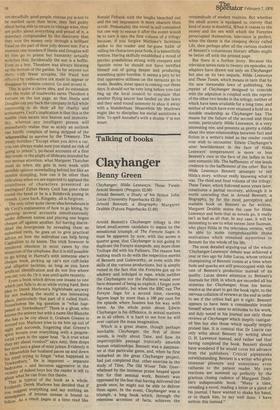Fiction
Going kiting
Duncan FaHowell
Cross Purposes Henry Cecil (Michael Joseph £3.75) Nightshade Derek Marlowe (Weidenfeld and Nicolson £3.75) Maybe 'load of cobblers' is not an expression that should spring readily to the pen of one who has had Labienus in the nursery and Cicero in the yard. But when you are heir to a collection of clay beds off the Bath Road, with a fondness for such cereals as gin, then calling a spade a spade is occasionally among one's lot. This apology is elicited by Henry Cecil's new cobbler, Cross Purposes, his eight hundred and fiftieth or something, which seems to be no guarantee that he intends to stop at that like a brick. Cecil's reputation as a humorist rests on Brothers in Law and the BBC, as a writer on c legal conundrums got up into short stories. Extremely pleasant so far. Then a kind of cruel self-deception sets in; it is not the slightest fun but he is powerless to restrain the bobbing motions of that right hand: out it comes, gas, gas, gas, straight to his head, reinforcing the unfortunate fantasy, more gas, until such .a time as an intimate strongly advises electric shock treatment. It is always sad to see writing turn into an allied service of British Rail. But this is not a private tragedy exclusively. Henry Cecil and others like him are hastening the gloomy coniferisation of our landscape because oak trees cannot keep up with their neurotic demands upon pulp. As usual, it concerns us all.
Compliments first. The book is very readable. It passes through with a gastro-enteric facility, at the rate of thirty yards of print every few minutes, and if you have '0' level English (which most of his readers will not) gird up for an experience even more precipitate. This is a blessing of sorts as it gives time for a soak in the bath before bracing oneself for the intellectual slap of Crossroads and the wit of a plate of ginger snaps. Unless of course you work, In which case you will have to sweat it out between Waterloo and Tupenny Hatch. There is some restraint upon this mung when the author drops into multiple clauses and the odd polysyllable while taking up arms on behalf of our beleaguered middle class. He succumbs to this several times a chapter via a plot which is basically an excuse for it: what happens when a middle class family forced on to British sherry by school fees suddenly wins the pools? In the great tradition of the survival of the English backbone the answer is nothing whatsoever. Half a million pounds lifts them to sufficient pitch to give most of it to deserving causes, and then to return the remainder to the pools company. A more spineless backbone than Mr Cecil's one could never meet. Yes, they are dreadfully good people, riotous joy is not to be marked upon their brow, they feel guilty about being able to return to vintage wine, they are guilty about everything and proud of it, a quandary compounded by the discovery that they won the money only through a brilliant fraud on the part of their jolly decent son. For a moment one wonders if Sheila and Douglas will let him go to prison but humanity actually scotches that. Incidentally the son is a boffin. Even as a boy, Theodore was always blowing up the bottom of the garden. So for anyone out there with fewer scruples, the fraud was effec ted by radio-active ink made to appear or disappear by remote control. Go and invent it.
This is quite a clever idea, and its extension into the realm of roadworks earns Theodore a fortune on the last page, so that Sheila and Douglas can pay back the company in full while continuing to do their all for charity and scroungers. Cecil's implication is that this is the middle class ascent into heaven and immortality, whereas any intelligent person will immediately realise that so sickly an outlook can hardly complain of being stripped of the wherewithal to survive by the Treasury. The mealy homilies ("Except when you drive a car, you can always make sure you stand no risk of going to prison"), po-faced accounts of a first day inside or the plight of lifeboats intended for our serious attention, what Margaret Thatcher must do when she gets in next week with sensible opinion snowballing behind her like an outsize dumpling, how can it be other than ridiculous when we are expected to applaud the soundness of characters presented as meringues? Either Henry Cecil has gone clean round the bend or he is a Bolshevik posing in tweeds. Come back, Kingsley, all is forgiven. The only other quite clever idea hereabouts is Mr Cecil's explanation of how to go kiting, by opening several accounts simultaneously under different names and playing one bogus cheque off against another. So! having discredited the bourgeoisie by revealing them as enfeebled twits, he goes on to give practical advice on how the individual can help bring Capitalism to its knees. The trick however is rendered obsolete in most cases by the invention of the telephone. But it is still possible to go kiting in Harrod's with someone else's cheque book, picking up cat's eye cuff-links arid alligator neckties, so long as you have artificial identification and do not live where you say you do. Or it was until quite recently. From a book which drives one insane to one which just fails to do so while trying hard. Beta plus to Derek Marlowe's Nightshade anyway for not making the world a less interesting place, particularly that part of it called Haiti. Nonetheless the big question is "what happened at Tewkesbury?" There is a ghost who knows the answer but with a name like Blanche she has to be coy about it. Graham Greene is around too. Marlowe tries to tie him up out of sight and succeeds, forgetting that Greene's spirit hovers over everything with a proprietorial yawn in the upper heat. "Is it true what they saY about voodoo?" says Amy, then drops her evesinto a glass of mint juleps. Evidently it is ivt'eanwhile her husband paces up and down his mind trying to forget "what happened in TeWkesbury. He is Impotent — separate
bedrooms — and becomes aggressive in the of naked boys but the reader is left to vicinItY lean what he can from this theme.
g This is typical of the book as a whole. EvidentlY Derek Marlowe has decided that if u 5ggest everything and say nothing an vu atmosp here of intense unease is bound to follow. As a result pages at a time read like
Ronald Firbank with the laughs bleached out and the net impression is more obscure than occult. Presumably the novel is self-contained but one way to rescue it after the event would be to turn it into the first volume of a trilogy because, if you forgive Marlowe's facetious asides to the reader and far-gone habit of calling his characters poor fools, it is beautifully written. Having skilfully established a mood of psychic possibilities strung with creepers and Spanish moss he should not have terrified himself out of going deeper and producing something quite horrible. It seems a pity to let that oppressive stillness on the terrazza go to waste. Besides, inner space is coming out these days. It should not be very long before you can ring up the local council to complain that another flying saucer has landed on the lawn and they send round someone to shoo it away with a blunderbuss. Meanwhile Mr Marlowe might like to discipline his social ambitions a little. To spell Annabel's with a double 'I' is not smart.



























 Previous page
Previous page